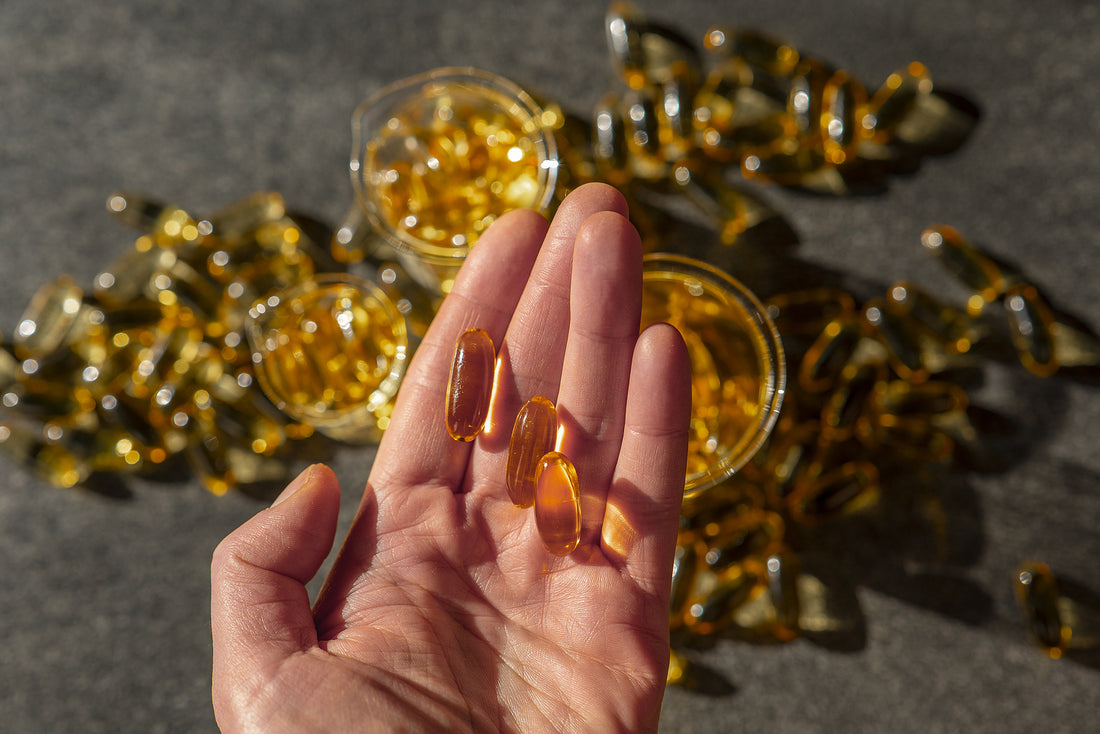Fish is one of those foods you either enjoy or don’t.
For some, it’s the fishy smell is that turns them off. For others, it’s the texture.
Either way, fish is a marvelous source of vitamins, minerals, protein, and essential fatty acids (1). It’s also low-fat, making it a great addition to a healthy diet.
Nowadays, even if you’re not a fan of fish you can still glean the health benefits by taking a fish oil pill.
What are the benefits of fish oil pills, and do you really need them? We uncover all you need to know so you can feel confident about making the best health choice for you.
Benefits of Fish Oil Pills
As we mentioned, fish is an excellent choice if you’re looking for a nutrient-rich food. But can all that goodness be packed into a pill?
Not really. The Dietary Guidelines for Americans recommends getting at least two servings of fish or seafood per week, but a recent survey showed that only 20% of Americans eat fish at least twice per week (2, 3). Kids eat less than that.
If the average American doesn’t eat fish very often, they likely aren’t getting the recommended amount of an important nutrient they need to stay healthy. I’m talking about omega-3 fatty acids.
Omega-3s comprise two polyunsaturated fats, docosahexaenoic acid (DHA) and eicosapentaenoic acid (EPA). These fats contain anti-inflammatory properties that help your body in a variety of ways.
So are fish oil pills good for you? According to research, these supplements can help support:
- Heart health: Symptoms such as high blood pressure and high levels of LDL cholesterol lead to heart disease and stroke. Studies have found that fish oil pills can moderately reduce both blood pressure and harmful cholesterol levels (4, 5).
- Brain health: Memory, concentration, and learning seem to be increasingly difficult. A study was done on 2,183 patients and found that those who had more omega-3 had larger hippocampus volumes in the brain. This part of the brain is responsible for memory and learning (6).
- Skin health: In the quest for younger, more vibrant skin, many are turning to fish oil pills to help hydrate and nourish their skin cells. Research confirms that omega-3s can help soothe inflammation-related skin concerns like acne, psoriasis, skin ulcers, and atopic dermatitis (7).
- Reduce inflammation: Omega-3s also have the potential to help alleviate joint pain and stiffness due to arthritis or other inflammatory diseases (8) and have been shown to benefit those suffering from autoimmune disorders such as Chron’s, lupus, and ulcerative colitis (8).
Dosage
How much fish oil you should take depends on your current health condition, diet, lifestyle, and how well you tolerate it.
While research is mixed, health professionals recommend anywhere between 250mg-3000mg per day (9). Because that’s such a wide range, it’s best to get a personalized wellness plan from a functional medicine doctor.
Precautions
While the benefits of omega-3 are outstanding, too much can cause some unpleasant side effects.
Some of the most common include (10):
- Heartburn
- Fishy aftertaste
- Nausea
- Diarrhea
Fish oil pills also have the potential to negatively interact with certain ingredients, such as those in:
- Blood pressure medication
- Weight loss medication or supplements
- Vitamin E
- Anticoagulant medication or supplements
- Birth control medication
Talk with your doctor if you’re concerned about any interactions or additional risks.
Other Ways to Get Fish Oil
If pills make you want to gag, there are other ways to get the health benefits of fish oil.
- Food: Fresh, wild-caught fish will always be your best source of fish oil. The
- Fish oil tablets: In addition to capsules, fish oil pills can come in tablet form.
- Fish oil liquid: If you’re ok with a liquid, many companies have found a way to produce fish oil that reduces or eliminates the typical fishy smell or taste.
- Vegan alternatives: Don’t like fish but still want the benefits of omega-3 in your diet? Plant-based sources include Brussels sprouts, flaxseed, hemp, algal oil, chia seeds, and walnuts containing omega-3 fatty acids in the form of alpha-linolenic acid (ALA) (11).
Back to You
Fish provides more than just a seaside dining experience. With all the types, flavors, and textures, it’s a fun way to try new foods and improve your health!
Among other nutrients, fish contain high levels of omega-3s, which are crucial for optimal health. Fresh, wild-caught varieties are the best way, but fish oil pills may help fill in the gaps if you’re experiencing joint pain, brain fog, or skin inflammation.
Do you really need them? Maybe, maybe not. If you’re eating fatty fish like salmon, trout, and mackerel regularly, you may not need as much as someone who isn’t. And if you really prefer to stay away from fish altogether, try plant-based foods instead. While they aren’t as potent, they can still help you get the nutrients you need.
Are your supplements expert-recommended? Find out in this article here (12)!
References
1. https://doh.wa.gov/community-and-environment/food/fish/health-benefits]
2. https://www.cdc.gov/nchs/products/databriefs/db321.htm
3. https://health.gov/sites/default/files/2019-09/2015-2020_Dietary_Guidelines.pdf
4. https://www.ahajournals.org%2Fdoi%2Fpdf%2F10.1161%2F01.CIR.88.2.523%3Fdownload%3Dtrue&psig=AOvVaw07lwMPMf9SWT4NHA-OdoHI&ust=1680566924062185
5. https://www.ncbi.nlm.nih.gov/pmc/articles/PMC3875260/
6. https://n.neurology.org/content/99/23/e2572
7. https://pubmed.ncbi.nlm.nih.gov/32463305/
8. https://pubmed.ncbi.nlm.nih.gov/12480795/
9. https://ods.od.nih.gov/factsheets/Omega3FattyAcids-HealthProfession
10. https://www.mayoclinic.org/drugs-supplements-fish-oil/art-20364810
11. https://www.healthline.com/nutrition/7-plant-sources-of-omega-3s
12. https://karamd.com/blogs/health/are-your-supplements-expert-recommended
✝✝This noted statement is based on independent research and is not necessarily the opinion of the author
